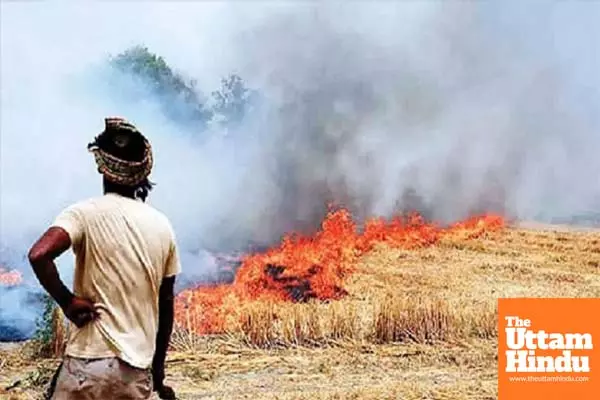
Hearing on stubble burning held in SC today
Punjab government acts, cases registered against 9 officials, and Haryana also receives a reprimand.

Amritsar (The Uttam Hindu): A hearing regarding pollution and stubble burning in Delhi is set to take place today (Monday) in the Supreme Court. In the previous hearing, the Punjab government was reprimanded for providing incorrect information, and the Haryana government received an unsatisfactory response. Justices Abhay Oka and Augustine George Masih are presiding over the case. The Punjab government has shown readiness to act before this hearing.
The Punjab government has initiated criminal action against nine officials from three districts ahead of the hearing. These officials failed to prevent stubble burning incidents in their areas. Prosecution has been initiated against these nine officials under Section 14(2) of the Air Quality Management Commission (CAQM) Act, 2021.
One official reported that a criminal complaint has been filed against the nodal officer of Kishanpura Kalan village in the Dharmkot sub-division of Moga district. In Tarn Taran, charges have been filed against three officials. In Firozpur, action has been taken against an agricultural extension officer, a junior engineer from the drainage department, and three panchayat secretaries. According to Firozpur's SSP, Soumya Mishra, the police have also launched a campaign against rule violators. So far, 296 FIRs have been registered, with 121 cases filed in the last four days. Moga's DC, Vishesh Sarangal, issued show-cause notices to two SDMs, two SHOs, and other officials on Sunday. Sarangal mentioned that the Punjab Remote Sensing Center, Ludhiana, has registered 105 cases of stubble burning incidents and imposed fines totaling ₹1.72 lakh on violating farmers.
Firozpur's DC, Deepti Sharma, stated that notices have been issued to over 102 officials from the rural development and cooperation departments for failing to prevent stubble burning incidents. She noted that due to strict measures and multi-layered strategies this year, a 58% reduction has been observed compared to last year. Under Section 14(2) of the CAQM Act, these offenses are non-bailable and are heard by a judicial magistrate (first class). If the charges are proven and the accused is found guilty, fines of up to ₹1 crore can be imposed, along with a possible five-year prison sentence or both.
**What Happened in the Previous Hearing**
In the last hearing, the Chief Secretaries of Punjab and Haryana appeared in court. The Supreme Court reprimanded the Punjab government for providing false information. The bench of Justices Abhay S. Oka, A. Amanullah, and A.G. Masih described the efforts of the Punjab and Haryana governments to curb stubble burning as merely superficial.
The court stated that if these governments were genuinely interested in enforcing the law, at least one case should have been pursued. The Supreme Court even remarked that it is time to remind the central, Punjab, and Haryana governments that living in a pollution-free environment is a fundamental right of citizens. Living in pollution is a serious violation of fundamental rights under Article 21. The Supreme Court granted the central government two weeks to formulate rules under the Environmental Protection Act (EPA) regarding air pollution and to appoint responsible officials, of which 12 days have now passed.
Due to the continuously rising pollution levels in Delhi-NCR, the Supreme Court criticized the Air Quality Management Commission (CAQM). The court stated that the commission has not established any mechanism to enforce the strict measures needed to prevent pollution. It questioned why direct action was not taken against officials who failed to prevent pollution and why they were merely issued notices for responses. The central government had assured the Supreme Court that action would be taken against those burning stubble under the CAQM Act within ten days, and the central government is expected to present its position in court today.

